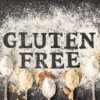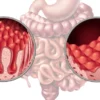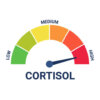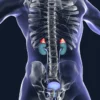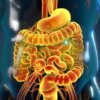
What is Diverticulitis?
Diverticular disease is a term used to describe a range of digestive-related issues. This primarily includes the presence of diverticular in the colon. These pockets along the gut wall can be present without symptoms, with a very high percentage of the population developing these without being aware.
It has been found that up to 33% of the US population develop these pouches by the age of 60 and 66% by the age of 85.
While the presence of these pouches in the gut wall is termed diverticulitis, it is once these become inflamed that symptoms appear. Diverticulitis is the inflammation of these pouches in the gut wall which can then lead to symptoms such as pain, changes in bowel movements as well and bleeding. [Source: JAMA]
During a flare-up in symptoms, there can be certain foods to avoid and others to include. Additionally, certain ways of eating when not experiencing a flare-up have been indicated to reduce the likelihood of symptoms increasing to a flare-up. [Source: JAMA]
What Causes Diverticular Disease and Diverticulitis
There are several factors that can increase the risk of developing diverticular disease and diverticulitis.
These include:
- Age
- body mass index
- dietary fat intake
- fibre intake
- red meat consumption
- physical activity
- cigarette smoking
- the use of certain medications (NSAIDs and acetaminophen)
The result of this is also imbalances in the gut microbiome which may then influence the structure of the colonic wall. It is also the case that this can occur in the opposite direction also with alterations in the gut lining then contributing to microbiome imbalances.
Fatigue, tiredness and Diverticular Disease
Emerging research indicates that diverticular disease may be a disease of ageing. In a similar way to the changes in skin health (for example, wrinkles) similar alterations in the structure of the gut lining may also occur. This can relate to the dysfunction of certain parts of the cells in the colon lining called mitochondria.
Mitochondria are the parts of the cells that produce energy, and mitochondrial dysfunction can impair cell regeneration and repair. Studies have found that in older test subjects, mitochondrial function increased in line with the presence of diverticulosis indicating a clear link. [Source: Pubmed]
Is Blood Common in Diverticulitis?
While the presence of these pouches does not mean that there will be further complications in digestive health. It’s very common for these pouches to be present and not to lead to digestive symptoms.
However, in a certain number of patients with diverticulosis, symptoms can increase which is often referred to as a complication of diverticulosis. These complications can occur in between 10%-35% of patients with diverticulosis.
These gut symptoms can include pain and discomfort as well as bloating. Due to the irritation in the gut, these symptoms can also include bleeding which can often require medical treatment. [Source: JAMA]
 Should I avoid nuts, seeds or popcorn in Diverticulitis?
Should I avoid nuts, seeds or popcorn in Diverticulitis?
Essentially, nuts, corn and popcorn are foods that do not generally need to be avoided in those with diverticular disease. A long-held belief was that these foods could irritate the gut and potentially get stuck in the diverticular pouches. This may then contribute to inflammation or bleeding. However, recent studies have indicated this is not the case.
A study carried out over 18 years concluded that the consumption of nuts, corn and popcorn did not increase the likelihood of diverticular complications. In fact, the study reported that the opposite may be true and that these foods may actually reduce the risk of a complication. [Source: JAMA]
This translated to the inclusion of these foods at least twice a week was found to reduce the risk by 20% for nuts and 27% for popcorn. [Source: Pubmed]
The study also reported that there was no link between eating nuts, corn and popcorn and events of bleeding as the result of diverticular complications.
Should I eat nuts, seeds or popcorn in Diverticulitis?
It’s also been reported the results of a survey of colorectal surgeons. This reported that 47% of these surgeons believed these foods should be avoided, indicating that dietary approaches are often recommended based on outdated information.
It is also well known that foods such as nuts are high in anti-inflammatory nutrients and the consumption of nuts is associated with lower levels of systemic inflammation. The presence of minerals such as zinc and magnesium in nuts can also support the health of the colon via mechanisms that involve supporting collagen formation and reducing oxidative stress. Therefore it is likely that the inclusion of these foods will support gut health. [Source: JAMA]
However, even if research indicates that food should be safe if an individual notices that this is a trigger for their symptoms, it is generally best this food be limited or avoided completely.
Can Eating Too Much Fibre Cause Diverticular Disease?
Changes in the balance of fibre consumption have been indicated to be a factor relating to the onset of diverticular disease and diverticulitis. However, due to the slow onset of this disease and at fact that many with diverticular do not experience symptoms, it can be challenging to find clear links.
Lower fibre intake has been associated with a higher risk of developing diverticular conditions. This may be due in part to the benefits of fibre in supporting transit time and the balance of the gut microbiome.
Additionally, a higher-fibre diet is generally considered to be less processed with a higher density of vitamins and minerals. The presence of these can support antioxidant and repair processes along the lining of the gut, leading to a stronger gut lining.
It is also important to take into consideration the other risk factors that can cause diverticular disease. This includes meat consumption, smoking, obesity and the use of non-steroidal anti-inflammatory pain medication.
Studies have also reported that when compacted to a Mediterranean-style diet (high in vegetables, fruits and unprocessed grains) a Western diet (high in red meat, processed grains and high-fat dairy) increased the risk of developing complications of diverticulosis, such as diverticulitis. [Source: Pubmed]
Is Smoking Bad for Diverticulitis?
Smoking is considered a risk factor for diverticular disease. This has been reported as a 30% increase in the risk of development of diverticular disease when compacted to non-smokers.
Smoking may also contribute to an increased risk of complications in diverticular disease. This was reported in a study that concluded that the risk of hospitalisation due to complications of diverticular disease was 24% higher in smokers when compared to non-smokers.
It was also reported that long-term cessation of smoking was required to show an improvement. This was reported as a 10-year period of time was required to lead to a reduced risk of diverticular complications.
A second study in men found that smokers have a 60% increased risk of hospitalisation with increased rising in line with the number of cigarettes smoked each day. [Source: Pubmed]
List of Foods to Include on a Diverticulitis Diet
For long-term digestive support, there are certain dietary factors that can be considered and implemented. The aim of these dietary considerations is to support digestive health to provide resilience and strength to the gut.
This dietary structure is often referred to as the Mediterranean diet and involves the focus on including certain foods. The overview of this diet can be considered as being:
- High in a varied range of fruits
- High in a varied range of vegetables
- High in a varied range of herbs and spices
- Fermented foods
- Good quality protein (fish, eggs, nuts, seeds, beans)
- Olive oil
Fibre-rich foods may help to support overall digestive health and reduce the occurrence of further complications. The range of colourful plant compounds (polyphenols) also supports antioxidant and repair processes within the gut, supporting overall digestive health. [Source: Pubmed]
List of Foods to Limit or Avoid on a Diverticulitis Diet
During a flare-up in symptoms or when there is diverticulitis the gut can become very irritated and sensitive. This can mean that during a flare in diverticular symptoms, certain foods may need to be limited or avoided entirely.
This can lead someone to follow a low FODMAP diet. This is a dietary template that can be considered to reduce certain fruits, vegetables and grains that contain a higher amount of certain carbohydrates.
While these are considered healthy foods, if the gut is irritated these foods may produce more gas or irritate the gut lining, contributing to symptoms.
Some of the most problematic FODMAP foods include:
- Apples
- Garlic
- Onion
- Asparagus
- Beans
- Lentils
- Artichokes
- Cauliflower
- Lactose
- Wheat [Source: Pubmed]
In some cases, the full and most restricted version of the diet may not be required to reduce gut symptoms while in others symptom severity may indicate that a more restricted diet is needed in the shorter term.
In some situations, the pain that can be present in diverticulitis may mean that some patients find a liquid diet or a diet containing only pureed food is needed. However, this is best assessed on a case-by-case basis while supported by a qualified health practitioner. [Source: Pubmed]
Drugs to Avoid with Diverticulitis
Medications and drugs can be helpful in reducing the severity of certain digestive and gut issues such as pain. However, there are certain pain-killing medications that may increase the risk of further issues related to diverticular disease.
It’s been reported that certain medications increase the risk of these gut conditions. This refers to the increased risk of the initial development of diverticular disease and also bleeding from diverticular disease.
These medications include:
- NSAIDs
- Aspirin
- Paracetamol
- Corticosteroids
- Opioids [Source: Pubmed]
Diverticulitis Foods to Avoid Alcohol
The use of alcohol has been indicated to be considered a significant risk factor for diverticular conditions. While the exact reasons or combination of reasons for this is not fully understood, factors are likely to include:
- An impact of bowel motility/bowel movements
- The ability of alcohol to damage the gut lining via oxidative stress
- Impact on the gut microbiome [Source: Pubmed]
It has also been reported those that who consume alcohol have an increased risk of experiencing bleeding as a form of diverticular complications. This is understood to be via the direct irritation of damage to the gut lining, in a similar manner to gastritis. [Source: Pubmed]
It is also important to note that those who consume more alcohol will also be more likely to over-consuming more processed and refined foods, typical of the Western diet. [Source: Pubmed]
Psyllium Husk for Diverticular Disease
Psyllium husk is a type of fibre classed as a soluble fibre. This means it dissolves in water. This has been indicated to help with both preventing but also the treatment of a range of gut issues such as IBS, IBD and diverticular conditions.
When introduced to the colon, these fibres form a gel-like substance which can help with bowel movements and improve symptoms of constipation. It’s also possible for these fibres to be fermented by the bacteria in the colon from which short-chain fatty acids are produced. They play a central role in supporting bowel transit time.
This indicates that this type of fibre can be used to improve the balance of the gut microbiome and contribute to better gut health. [Source: Pubmed]
Nutrition Advice for Diverticula Disease
There are specific ways to reduce symptoms during an active flare-up of diverticular symptoms. This can be considered an important part of any strategy to calm these digestive symptoms of pain or bloating.
While the main focus on a dietary approach can involve removing processed foods and focusing on natural plants and protein sources, in some cases further restrictions can be helpful to calm symptoms. This is where the reduction or removal of certain high-fibre fruits or vegetables may be helpful to calm these gut symptoms.
Alongside this approach, it can also be important to take into consideration any and all of the possible risk factors that may continue to contribute to the ongoing nature of the conditions. Not only does this include diet but also factors such as medications, smoking habits, alcohol intake, stress levels and quality of sleep.
By taking all of these factors into consideration, this holistic approach aims to support the body and provide more resilience to the gut to not only calm a flare-up in symptoms but to reduce the risk of future flare-ups or complications.

 Should I avoid nuts, seeds or popcorn in Diverticulitis?
Should I avoid nuts, seeds or popcorn in Diverticulitis?